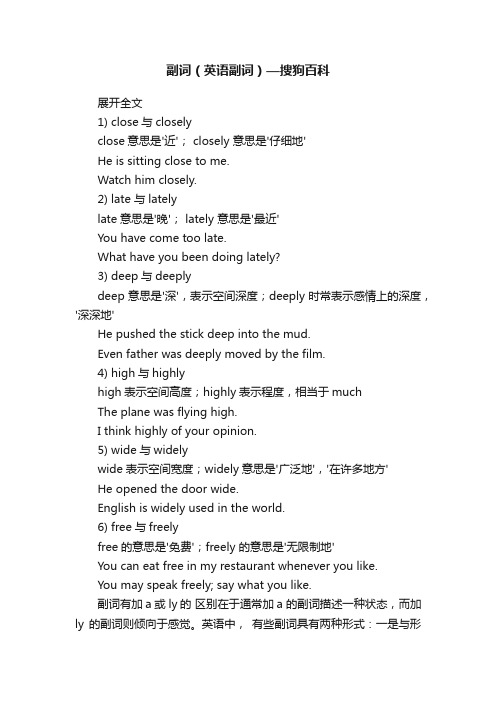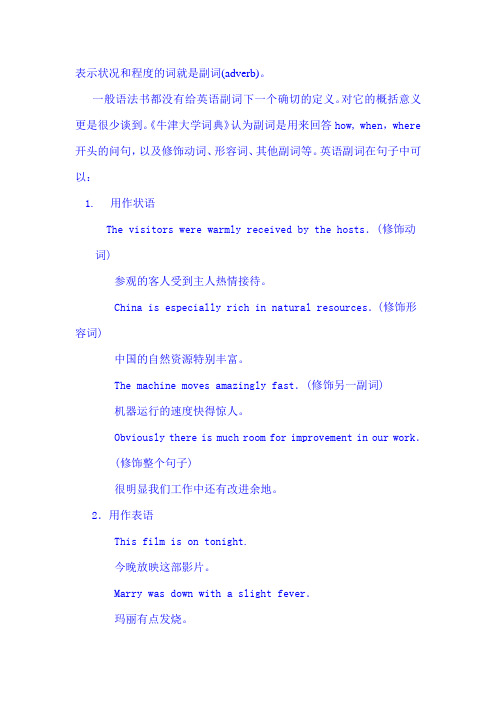3.3 英汉副词比较与翻译
副词(英语副词)—搜狗百科

副词(英语副词)—搜狗百科展开全文1) close与closelyclose意思是'近'; closely 意思是'仔细地'He is sitting close to me.Watch him closely.2) late 与latelylate意思是'晚'; lately 意思是'最近'You have come too late.What have you been doing lately?3) deep与deeplydeep意思是'深',表示空间深度;deeply时常表示感情上的深度,'深深地'He pushed the stick deep into the mud.Even father was deeply moved by the film.4) high与highlyhigh表示空间高度;highly表示程度,相当于muchThe plane was flying high.I think highly of your opinion.5) wide与widelywide表示空间宽度;widely意思是'广泛地','在许多地方'He opened the door wide.English is widely used in the world.6) free与freelyfree的意思是'免费';freely 的意思是'无限制地'You can eat free in my restaurant whenever you like.You may speak freely; say what you like.副词有加a或ly的区别在于通常加a 的副词描述一种状态,而加ly 的副词则倾向于感觉。
英语中,有些副词具有两种形式:一是与形容词同形;二是由该形容词后加-ly构成(以下称形容词形副词和-ly形副词)。
英汉副词的差异

表示状况和程度的词就是副词(adverb)。
一般语法书都没有给英语副词下一个确切的定义。
对它的概括意义更是很少谈到。
《牛津大学词典》认为副词是用来回答how, when,where 开头的问句,以及修饰动词、形容词、其他副词等。
英语副词在句子中可以:1.用作状语The visitors were warmly received by the hosts.(修饰动词)参观的客人受到主人热情接待。
China is especially rich in natural resources.(修饰形容词)中国的自然资源特别丰富。
The machine moves amazingly fast.(修饰另一副词)机器运行的速度快得惊人。
Obviously there is much room for improvement in our work. (修饰整个句子)很明显我们工作中还有改进余地。
2.用作表语This film is on tonight.今晚放映这部影片。
Marry was down with a slight fever.玛丽有点发烧。
His leave's up tomorrow.他的假期明天到期。
3.用作定语All the buildings around were built in 1983.附近的全部房子都是在1983年盖的。
The above remarks are quite to the point.上面的评语是很中肯的。
I’ll come over to see you on my next day off.我下次休假时再来看你。
4.用作补语I found them in.我见到他们在家里。
They went to the airport to see the friends off.他们到机场为朋友送行。
汉语副词在句子中的作用只能作状语、修饰动词、形容词或者其他副词。
初中英语副词语法归纳:常考副词区别使用(3)

初中英语副词语法归纳:常考副词区别使用(3)一、如何区别also,too, either与as wellalso, too, either与as well 均可表示“也”,用法及其区别分述如下:1.too 和 as well两者多用于口语中,语气较轻,通常用于肯定句或疑问句,一般不用于否定句,且通常放在句末。
如:He divorced her, and a good thing too [as well. 他和她离了婚,这也是一件好事。
I will come on condition (that) she is invited too [as well].如果激请她来.那我就来。
He was just another child from the shelters. There were other children too [as well]. 他只是来自收容所的另一个孩子,另外还有其他一些孩子。
too 有时也紧跟在主语后(注:as well 不这样用),此用法较正式。
如:But you. too. can buy coloured metal ones. 但是你也可以买彩色金属制品。
The Internet too. it goes without saying. is a good source of information.不用说,因特网也是一个很好的信息来源。
在 Me too, You too 这类简略答语中,通常不用 as well, also。
如:“I'm feeling hungry.”“Me too.”“我觉得饿了。
"我也是。
”“I love chocolate.”“Me too.”“我喜欢巧克力。
”“我也喜欢。
”2.关于 asloalso 比too 和 as well 正式,一般也不用于否定句,它在句中的位置通常是紧靠动词,即放在行为动词之前,特殊动词之后。
第一讲汉英词语比较与翻译

情感意义不对应
过去我们在对外宣传中,一直把“宣传” 译为 “propaganda”(贬义的成分为多,使人 易与吹牛、说谎、怀有政治目的等负面含 义联系起来),现在多使用“publicity”等中 性词;“精神文明”被译ritual civilization, 在外国人的心目中含有宗教色彩,现在改 “ethical and cultural progress”以及其他译法。
同时,市场自身的弱点和消极方面也会反 映到人们的精神生活中来。
[译文]Meanwhile,the weak points and negative factors involved in market operation will find expression in people’s cultra1 life.
文字(script),也称书面语言(system of writing),是语言的有形记录,它的出现往 往晚于所记录的语言。
人类历史上有四种最古老的表意文字,它 们是古埃及的圣体字,古苏美尔人的楔形 文字,中美洲玛雅人的文字和古汉字。除 了汉字至今保持着旺盛的生命力,其余的 三种文字都已湮没在历史的长河中。
联想意义不对应 有一次,译员用英语通知一位外国专家参
加一个会议,其中有一句话是“You had better attend the meeting on time.(您最好及 时参加这个会。)英语的语法是毫无问题的。 但外国专家听后十分不悦,原来“had better do sth.”只能用于上级对下级,老师 对学生,老一辈对下辈,同等地位或年龄 的人之间。
英汉对比形容词和副词

THANKS FOR WATCHING
感谢您的观看
ห้องสมุดไป่ตู้
详细描述
英语和汉语在表达方式和语义上有很大的差 异,如果译者对某一方的语义理解不够深入 ,就容易在形容词或副词的使用上出现错误 。例如,英语中“beautiful”常用于描述 女性,而在汉语中“美丽的”不仅用于描述 女性,还可以用于描述风景、建筑等。
语法结构错误
总结词
由于对英语或汉语的语法结构掌握不准确, 导致形容词或副词的语法使用出现错误。
英语中程度副词可以表示强调 或减弱语气,而汉语中程度副 词则更注重表示程度的大小。
频率副词的对比
英语和汉语中都有频率副词,如 “总是”、“经常”、“偶尔”
等。
英语中频率副词可以修饰动词、 形容词或副词,而汉语中频率副
词通常修饰动词。
英语中频率副词可以表示动作发 生的频率,而汉语中频率副词则 更注重表示动作发生的频繁程度。
04
英汉形容词和副词的翻 译技巧
直译法
总结词
直接翻译,保留原文形式和意义
详细描述
直译法是翻译中最为基础的方法 ,它尽可能地保留原文的词汇、 语法和修辞特点,力求使译文与 原文在意义和风格上达到一致。
意译法
总结词
解释原文含义,调整表达方式
详细描述
当直译法无法保留原文的修辞或表达方式时,可以采用意译法。意译法更注重于解释原 文的含义,而不是保留原文的表达方式,因此在翻译过程中可能需要调整语法结构或修
详细描述
英语和汉语中有些描述性形容词的语义和用法不完全对应 。例如,“happy”在英语中表示高兴、愉快,而在汉语 中则可以表示幸福、愉快、满足等多种含义。
限定性形容词的对比
总结词
英汉语言对比研究-词法对比翻译

三、汉英词汇视点差异
汉英两民族在思维上差异,表现在语言思维视点上也有 差异——从不同的思维视角来看待同一事物 。其具体差 异如下: 1.汉英修饰词的转换 A. 有时英语修饰词与汉语相反的情况: 抢险车 a breakdown lorry (不等于 a lorry that has broken down) 防暴警察 riot police (即 anti-riot police) 消防队 a fire brigade 打九折 a 10 percent discount 寒衣 warm clothes 候机室 the departure lounge
汉语词义的模糊性有其优点,有利于词汇的组合与 灵活运用,但在英译时,由于汉英在形象与喻义、所指 与内涵方面存在较大差异,稍不注意便可能导致语义不 准确。
1.形象与喻义 形象与喻义
如: (1).现在的问题时抓“落实”,以确保已出台的政 策措施全部到位。 从字面上看,英语的“抓”, “出台”, “到位”都不合此 上下文,这是汉语的形象表达,在译文中要用“使生 效”、“实行”和“执行”才能将英语实际意义表达出 来呢? To ensure full implementation of the polices and measures already introduced, the question now is how to bring them into effect.
自学 teacher himself (a self-taught student)
E. 观察事物的角度或联想意义不一样 close the door behind you.——着眼于人所在的位置 随手关门——着眼于手 lie on one ‘ s back ; lie on one ’ a stomach -一以后背为准; 仰卧;伏卧一一以面向为准 胆小如鼠 as timid as a rabbit ; 蠢得像猪 a s stupid as a goose 雨后春笋 be like bamboo shoots after a spring rain F.词语的排列顺序不同 前后back and forth 新旧old and new 冷热hot and cold
表示比较的副词
表示比较的副词副词是一种用来修饰动词、形容词、副词等的词语,用于表达程度、方式、时间等概念。
在英语中,表示比较的副词被广泛应用,可以用来对两个或多个事物之间的差异进行比较。
以下是一些常用的表示比较的副词及其用法:1. More(更多地)- 用于比较两个事物的程度差异时,通常在形容词或副词的前面加上more。
例句:- He runs more quickly than his brother.- Sarah has more friends than John.2. Less(更少地) - 用于比较两个事物的程度差异时,通常在形容词或副词的前面加上less。
例句:- This car is less expensive than that one.- He talks less loudly than his sister.3. Earlier(更早地) - 用于比较两个事件发生的时间先后,通常在动词的前面加上earlier。
例句:- I woke up earlier than usual today.- She arrived earlier than I did.4. Later(更晚地) - 用于比较两个事件发生的时间先后,通常在动词的前面加上later。
例句:- The meeting will start later than expected.- He finished his homework later than his classmates.5. Faster(更快地) - 用于比较两个事物的速度时,通常在动词的前面加上faster。
例句:- The cheetah runs faster than any other animal.- He types faster than his colleagues.6. Slower(更慢地) - 用于比较两个事物的速度时,通常在动词的前面加上slower。
英汉语言比较与翻译
天下雨,运动会延期了。 The sports meet was postponed because of rain. Because of rain, the sports meet was postponed.
Please compare:
We saw many signs of occupation while strolling along a street past a major concentration of the huts not far away from the Central Avenue. 我们看到很多住人的迹 象,当漫步街头走过一个 很大的棚户集中地,离中 央大道不远。
English Order of Linguistic Elements 英语语序
Relatively flexible order (语序相对灵活) resulting from the use of inflections and connectives Phrases:
the Russian people, a pretty and clever girl the people of Russia, a girl pretty and clever the people living in Russia, a girl who is pretty and clever the people who live in Russia
our great socialist motherland that beautiful slim young foreign lady a small round wooden table 一张木头小圆桌 a high steep mountain 一座陡峭的高山 我们要把中国建设成为一个社会主义的现 代化强国。 We will build China into a modern, powerful socialist country.
副词对比与翻译
英汉语副词对比与翻译副词是指从时间、程度、范围、情状、语气等方面,对动词、形容词、副词、名词等起修饰、限制、补充或连接作用的一类词。
英汉语副词都有其次分类,一般都可以分为时间副词、范围副词、程度副词、频率副词、情状副词、否定副词、连接副词等。
1)时间副词:表示事件发生的时间。
a. 人们的生活终于回归了正常秩序。
b. Finally, people's life returned to a normal order.2)范围副词:表示对事件某一方面的周边界限。
a. 这骚乱仅仅是人们不满的一种表露而已。
b. This riot is only one manifestation of people's discontent.3)程度副词:表示事件的状态或动作行为发展到的状况。
a. 他是个极其老实的人。
b. He is an extremely frank person.4)频率副词:表示事件在某一时间内动作行为重复的次数。
a. 人们应经常洗澡以保证个人卫生。
b. People should wash regularly to ensure personal hygiene.5)情状副词:表示事件发生时的情态或状况。
a. 猛然间我想起了先前曾在那里见到这个男孩。
b. It suddenly came back to me where I had seen the boy before.6)否定副词:表示对事件的行为或状态的否定。
a. 实际上她是在暗示对他不感兴趣。
b. She is actually implying that she is not interested in him.7)连接副词:起连接作用。
a. 没有空气,我们就不能生活。
b. If there were no air, we couldn't live.从以上例句,我们可以看出,英汉语副词在句中多数是用来修饰动词或形容词,在句子中充当状语成分。
高考英语大纲3500之副词总结
高考大纲词汇之副词总结(总计128个)时间副词(18个)now [naʊ] ad. 现在nowadays [ˈnaʊədeɪz] ad. 当今,现在then [ðen] ad. 当时,那时,然后,那么ago [əˈɡəʊ] ad. 以前before [bɪˈfɔː(r)] ad.以前conj. 在…之前soon [sʌn] ad. 不久,很快,一会儿already [ɔːlˈredɪ] ad. 已经yet [jet] ad. 尚,还,仍然still [stɪl] ad.仍然,还;a.不动的,平静的today [təʊst] ad.& n.今天;现在,当前tomorrow [təˈmɔrəʊ] ad. & n.明天tonight [təˈnaɪt] ad.& n. 今晚,今夜yesterday [ˈjestədeɪ] n.& ad. 昨天late [leɪt] ad.晚地,迟地;a.晚的,迟的lately [ˈleɪtlɪ] ad. 最近,不久前ever [ˈevə(r)] ad. 曾经;无论何时past [pɑːst; (US) pæst]ad. 过n.过去,昔日,往事once [wʌns]n.& ad. 一次,一度,从前conj. 一旦疑问副词:引导特殊疑问句(4个) When:就时间提问;Where:就地点提问Why:就原因提问;How:就方式、方法就程度提问地点副词( 22个)here [hɪə(r)] ad. 这里,在这里;向这里there [ðeə(r)] ad. 在那里,往那里;up [ʌp] ad. 向上;在上方;起来;在…以上down [daʊn] prep. 沿着,沿…而下ad. 向下downstairs [ˈdaʊnsteəz] ad. 在楼下;到楼下downtown [ˈdaʊntaʊn] ad. 往或在城市的商业区downward [ˈdaʊnwəd] ad. 向下away [əˈweɪ] ad. 离开;远离home [həʊm] ad. 到家;回家;n. 家ahead [əˈhed] ad. 在前,向前about [əˈbaʊt] ad. 大约;到处;四处above [əˈbʌv] ad. 在……之上abroad [əˈbrɔːd] ad. 到(在)国外outdoors[aʊtˈdɔːz] ad. 在户外, 在野外upstairs [ʌpˈsteəz] ad. 在楼上,到楼上upward [ˈʌpwəd] ad. 向上;往上nowhere [ˈnəʊweə(r); (US) ˈnəʊhweər]ad.任何地方都不,无处back [bæk] ad. 回(原处);向后a. 后面的n. 背后backward(s) [ˈbækwəd] ad. 向后out [aʊt]ad. 出外;在外,向外;熄near [nɪə(r)] ad. 附近,邻近;a. 近的somewhere [ˈsʌmtaɪmz]ad. 在某处方式副词:主要以形容词加-ly构成,规律如下:1.一般情况:加-ly 例:quick—quickly,brave—bravely,clear—clearly2.双音节,多音节,y结尾:将y变为i再加-ly 例:easy—easily,happy—happily,heavy—heavily3.单音节,y结尾:直接加-ly 例词:gay—gaily/gayly,dry—dryly,shy—shyly4.元音字母+e结尾:去e加-ly 例:true—truly5.le结尾:去e加-y;例词:terrible—terribly,possible—possibly6.Ic结尾:加-ally 例词:basic—basically,scientific—scientifically7.ll 结尾:只加-y ;例词:full—fully,dull—dully,small—smally频率副词( 11个)always [ˈɔːlweɪz] ad. 总是;一直;永远usually [ˈjuːʒʊəlɪ] ad. 通常,经常often [ˈɔf(ə)n; (US) ˈɔːfn]ad. 经常,常常frequently [ˈfriːkwəntli] ad. 经常地;频繁地constantly [ˈkɔnstəntli] ad. 经常地,不断地occasionally [ə'keɪʒnəli] ad.偶尔地sometimes[ˈsʌmtaɪmz] ad. 有时seldom [ˈseldəm] ad. 很少,不常hardly [ˈhɑːdlɪ] ad. 几乎不rarely [ˈreəli] ad. 很少;难得never [ˈnevə(r)] ad. 决不,从来没有程度副词( 22个)fairly [ˈfeəlɪ] ad. 公正地,正当地;相当(程度)地pretty [ˈprɪtɪ] ad.相当地;a. 漂亮的,俊俏的rather [ˈrɑːðə; (US) ˈræðər] ad. 相当,宁可quite [kwaɪt] ad. 完全,十分very [ˈverɪ] vad. 很,非常much (more,most) [mʌtʃ] ad. 非常;更加too [təˈnaɪt] ad.也,还,又,太,过分,很,非常greatly [ˈɡreɪt li] ad. 很;非常;大大地almost [ˈɔːlməʊst] ad. 几乎,差不多nearly [ˈnɪəlɪ] ad. 将近,几乎half [hɑːf] ad.一半地;不完全地;a.& n. 半,一半,半个high [haɪ] ad. 高地(表具体);a. 高的;高度的highly [ˈhaɪli] ad.高度地(抽象);很;非常;赞许地deep [diːp]ad. 深深地(具体);a. 深的;深刻的;深奥的deeply [ˈdiːplɪ] ad. 深深地(抽象);强烈地;(颜色)浓浓地partly [ˈpɑːtlɪ] ad.部分地,在一定程度上perfectly ['pɜːfɪktli]ad.完全地;无瑕疵地;完整地;完美地;really v [ˈrɪəlɪ] ad. 真正地;到底;确实even [ˈiːv(ə)n] ad. 甚至,连(…都);更altogether [ɔːltəˈɡeðə(r)]ad. 总共;完全;总的来说through [θruː] ad.穿(通)过;自始至终,全部throughout [θruːˈaʊt] ad. 自始至终关系副词( 3个)When:=on which代替先行词在从句中做时间状语Where:=in which代替先行词在从句中做地点状语Why:= for chich代替先行词在从句中做原因状语焦点副词( 12个)only [ˈəʊnlɪ] ad. 仅仅,只,才;a.惟一的,仅有的alone [əˈləʊn] ad.独自地;仅仅a. 单独的,孤独的also [ˈɔːlsəʊ] ad. 也even [ˈiːv(ə)n] ad. 甚至,连(…都);更just [dʒʌst] ad. 刚才;恰好;不过;仅a. 公正的merely [ˈmɪəlɪ] ad. 仅仅,只不过simply [ˈsɪmplɪ] ad.简单地,(加强语气)的确mainly [ˈmeɪnli] ad. 主要地;大部分地especially [ɪˈspeʃəlɪ] ad. 特别,尤其exactly [ ɪɡ'zæktli ] ad. 精确地;确切地too [təˈnaɪt] ad.也,还,又,太,过分,很,非常as well [æz wel] ad.也;又连接副词:(相当与并列连词) ( 13个)therefore [ˈðeəfɔː(r)] ad. 因此,所以besides [bɪˈsaɪdz] ad. 还有,此外otherwise[ˈʌðəwaɪz] ad.要不然,否则,另样however [haʊ'evə(r)] ad. 然而;无论如何;不管多么moreover[mɔːr'əʊvə(r)] ad.此外;而且furthermore[ˌfɜːðə'mɔː(r)] ad. 而且;此外still [stɪl] ad.仍然,还;a.不动的,平静的thus [ðʌs] ad. 这样;因而meanwhile [ˈmiːnwaɪl; (US) ˈmɪnhwaɪl] ad.同时引导名词性从句或不定式的副词When;why;where;how句子副词:(常用来修饰整个句子的副词)( 12个)frankly['fræŋkli] ad. 坦白地;坦率地honestly [ˈɔnɪstli] ad. 诚实地;老实地;的确clearly [ˈklɪəlɪ] ad. 清楚地,无疑地obviously [ˈɔbvɪəsli] ad. 显然地evidently [ˈevɪdəntli] ad. 显然地generally [ˈdʒenrəli] ad. 一般地;通常;普遍地briefly [ˈbriːf li] ad. 简短地fortunately [ˈfɔːtʃənətli] ad. 幸运地;幸亏luckily [ˈlʌkɪli] ad. 幸运地;幸亏地unexpectedly[ˌʌnɪk'spektɪdli] ad.未料到地;意外地naturally [ˈnætʃrəli] ad. 自然地;天生地hopefully [ˈhəʊpfʊli] ad.怀着希望地;但愿其他副词( 11 个)again [əˈɡeɪn] ad. 再一次;再,又alike [əˈlaɪk] ad. 很相似地,同样地else [els] ad. 别的,其他的instead [ɪnˈsted] ad. 代替,顶替maybe [ˈmeɪbiː] ad. 可能,大概,也许perhaps [pəˈhæps] ad. 可能,或not [nɔt] ad. 不,没no [nəʊ] ad. 不,不是a.没有,无,不OK[əʊˈkeɪ] ad. (口语)好,对,不错yes [jes] ad. 是,好,同意twice [twaɪs] ad. 两次;两倍。
- 1、下载文档前请自行甄别文档内容的完整性,平台不提供额外的编辑、内容补充、找答案等附加服务。
- 2、"仅部分预览"的文档,不可在线预览部分如存在完整性等问题,可反馈申请退款(可完整预览的文档不适用该条件!)。
- 3、如文档侵犯您的权益,请联系客服反馈,我们会尽快为您处理(人工客服工作时间:9:00-18:30)。
4) The pilot routinely radioed another agent on the ground. 飞行员跟另一个地勤人员进行了例行的无线电联络。 5) The sun affects tremendously both the mind and body of a man. 太阳对人的身心有着巨大的影响。
你能准确地把这句话译出来吗?
3.英语名词转译成汉语副词
(1) I have the honour to inform you that you will be sent abroad next month. 我很荣幸地通知你,下个月你将被派到国外。 (2)That old lady had the kindness to show me the way. 那个老太太善意地给我指了路。 (3)Fish have an instinct for water. 鱼生来就会水。 (4)It is our great pleasure to note that our economy is developing vigorously. 我们非常高兴地看到,我国的经济正在蓬勃地发展着。
Sure enough, he’ll come. It sure was a cold night.
但有些与形容词同形的副词,与加-ly的副词,意义大不一 样。
He was famous even then.
She spread the butter evenly on the bread. She came home very late last night. She has been very busy lately. Please come near. It was nearly 5 o’clock. He nearly fell into the river. Call me at seven sharp.
3. 3 英汉副词比较与翻译
何为副词?《牛津大学词典》认为副词是用来回答 how, when, where的问句,以及修饰动词、形容词及其他 副词等的词。
英语副词的功能主要是作状语,表示状况和程度,也 表示时间和地点等。但也不限于作状语,某些副词还可以 作表语、定语、补语。例如:
1. 作状语:
He runs fast.
4.英语副词转译成汉语动词和名词
1)Your hat is not on straight. 你的帽子没戴正。 2)The film has been on for 5 minutes. 电影已经放影10分钟了。 3)The meeting was over 10 minute ago. 会议在10分钟以前就结束了。 4) What is the fare to London and back? 去伦敦一个来回需要多少钱? 6) The supermarket would give everyone 10 percent off on all cash purchases. 那家超级市场将给每一位用现金购物的顾客10%的优惠。 7) Traditionally,there had always been intermarriage between the two countries. 两国之间一直有着相互通婚的传统。 8)She is physically weak but mentally sound. 她身体虚弱,但思想健康。
Close the window to keep the cold out.
而汉语副词在句中只能作状语,修饰动词、形容词或者 其他副词。少数副词可以做补语,但不能作定语,更不存 在表语的情况。例如: 1. 作状语: 他正在为考试作准备。 那个战士非常勇敢。 他学习特别努力。 他学习努力得很。
2. 有少数英语副词在句中的位置非常灵活。并且位置不同, 往往意义也不同。译成汉语时须特别注意。例如:
6) She didn’t succeed in ringing me up, for she dialed the wrong number. 她没有打通我的电话,因为她拨错了号码。 7) When he was diagnosed with cancer, Sandy and I reached the painful realization that Banjo was leaving us.
He runs very fast.
China is especially rich in natural resources.
2. 作表语: The film has been on for 10 minutes. Time is up, and you are dismissed. 3. 作定语: The remarks above are quite to the point. All the buildings around were built last year. 4. 作补语:
甚至汤姆都把自行车修好了。 汤姆甚至修理了自行车。 汤姆连自行车也修理了。
与形容词既有同形的副词,也有加-ly的副词,意义上没有什 么差别,只有语体上的区别。在口语或俗语中,通常使用不 加-ly的副词。例如:
Drive slow.
Come quick. 他必来无疑。 的确是个寒冷的夜晚。
He ran as quick (quickly) as he could.
2.英语形容词转译成汉语副词
1)We have known a similar past of humiliation and exploitation. 在过去,我们都同样遭受到凌辱和剥削。 2)The children would sing in piping Spanish, high-pitched and pure. 孩子们用西班牙语放声歌唱,歌声清晰嘹亮。 3) This is sheer nonsense. 这纯粹是胡说八道。 4) We have made a careful study of the soil properties in that region. 我们仔细地研究了该地区的土壤特性。 5) Our country places the highest value on good relations with developing countries. 我国高度地重视同发展中国家的友好关系。He aຫໍສະໝຸດ swered me sharply.
比较下面两种副词,意义上有什么差别。
He dug the ditch very deep. 他把沟挖的很深。 I was deeply moved by the story. 我深深地被故事感动了。 He was deep in thought. 他陷入深思。 He jumped very high. 他跳得很高。 People think highly of his behavior. 人们对他的行为评价很高。
Only he hunted two hares yesterday.
He only hunted two hares yesterday. He hunted only two hares yesterday. He hunted two hares only yesterday.
Even Tom fixed the bike. Tom even fixed the bike. Tom fixed even the bike.
6) She looked at me expectantly. 她用期待的目光看着我。 7)Hopefully, it will be done early next month. 下月初完成这项工作是大有希望的。 8)Independent observers have commented favorably on the achievements you have made in this direction. 有独立见解的观察家们对你们在这方面取得的成就给予了 很高的评价。
他被诊断患有癌症时,我和桑迪痛苦地意识到班卓将离开我们。
8) He had had a careful study of the map before he started off. 在出发前他就仔细看了地图。 9)Can you give an accurate translation of this sentence.
副词的翻译一般情况下不受词类的限制,根据具体情况, 可以译成其他词性,其他词性的词也可以译成副词。例如:
1.英语副词转译成汉语形容词
1)Traditionally,there had always been good relations between them. 它们之间一直有着传统的友好关系。 2) The computer is chiefly characterized by accuracy and quick computation. 计算机的主要特点就是准确和计算迅速。 3) I was deeply impressed by the film “Gone with the Wind”. 《乱世佳人》这部电影给我留下了深刻的印象。
